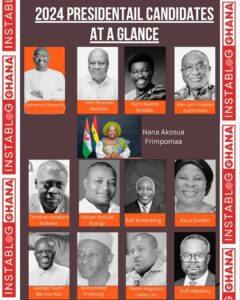The Electoral Commission of Ghana has officially released the names of candidates cleared to contest the 2024 Presidential Election, marking the beginning of what promises to be a competitive race. This year’s line-up showcases a mix of experienced politicians, emerging independent candidates, and some lesser-known personalities. With the election slated for later this year, the stage is set for intense political activity, debates, and discourse.
Among the candidates are familiar names from Ghana’s two major political parties. Mahamudu Bawumia, the Vice President and candidate of the New Patriotic Party (NPP), is set to challenge John Dramani Mahama of the National Democratic Congress (NDC), a former president making his third bid to regain the presidency. Both Bawumia and Mahama represent established political machinery, with decades of governance experience and widespread support across different regions. Their contest symbolizes the NPP-NDC rivalry that has dominated Ghanaian politics for decades.
However, what makes the 2024 elections particularly interesting is the rise of independent candidates and smaller political entities. Alan John Kwadwo Kyerematen, who recently broke away from the NPP, enters the race as an Independent Candidate, signaling dissatisfaction within the ruling party. His candidacy could potentially split the NPP vote, creating a more unpredictable outcome. Other notable independent candidates include George Twum-Barima-Adu and Kofi Koranteng, both of whom are seeking to challenge the traditional party dominance by offering new perspectives and policy ideas.
Also vying for the highest office in the land is Christian Kwabena Andrews, leader of the Ghana Union Movement, a party rooted in the ideals of Dr. Kwame Nkrumah. Alongside him is Nana Akosua Frimpomaa of the Convention People’s Party (CPP), representing yet another Nkrumaist faction that hopes to revive the CPP’s influence in Ghanaian politics. Both candidates are pushing for a return to Nkrumah’s socialist principles in a modern context, something they believe resonates with the everyday Ghanaian.
Other candidates in the race include Akua Donkor of the Ghana Freedom Party, Hassan Ayariga of the All People’s Congress, Daniel Augustus Lartey Jnr from the Great Consolidated Popular Party, and Kofi Akpaloo of the Liberal Party of Ghana. Their platforms, though often marginalized in terms of national support, add to the pluralism of the election and allow for a broader conversation on governance and development.
The list of candidates is not without some novelty. For example, Nana Kwame Bediako, also known as “Cheddar,” is running as an independent candidate (The New Force Movement Party), representing a growing class of wealthy business elites who believe their entrepreneurial experience can translate into effective governance. This shift towards private sector-led governance could be indicative of changing attitudes towards politics, where success in business is seen as a qualification for political leadership.

As the country gears up for what could be one of its most consequential elections yet, it is essential to note the growing dissatisfaction with the status quo. The rise of independent candidates and alternative political parties suggests a Ghanaian electorate increasingly willing to look beyond the two-party system for solutions to persistent issues such as unemployment, economic instability, and corruption.
Ghana’s elections have, in recent years, been celebrated for their peaceful and transparent conduct. As the campaigns officially begin, it is crucial for all parties and candidates to engage in peaceful, issue-based campaigning that respects democratic principles. The 2024 elections should not only be a contest of personalities but a debate on policies that can genuinely transform the nation.
The journey to the Jubilee House is now open, and with 13 qualified candidates, the 2024 Presidential Election could very well redefine Ghana’s political future. The next few months will be pivotal as Ghanaians weigh their options, listen to the candidates’ visions, and ultimately decide who will lead them for the next four years.
The Electoral Commission has set the tone, and now the nation waits in anticipation for the unfolding political drama.














